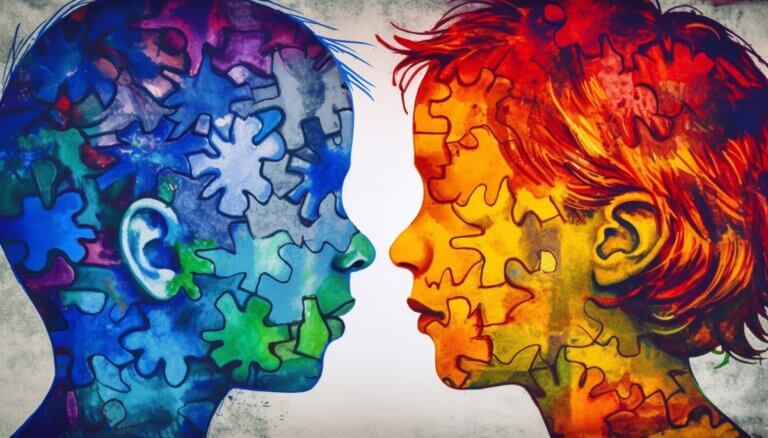Table of Contents
The Importance of Emotional Intelligence in Times of Crisis

Self-awareness and Self-regulation
Emotional intelligence in crises plays a crucial role in maintaining composure and acting effectively under pressure. This article sheds light on the two central pillars of emotional intelligence: self-awareness and self-regulation, and explores why they are particularly significant in challenging times.
Self-awareness is the foundation of emotional intelligence. Individuals with high emotional self-awareness are able to precisely identify and understand their own feelings. This not only allows for introspective insight but also improves communication with others. Take, for example, a project manager who is under tremendous time pressure. Through his ability to recognize frustration or stress, he can consciously take steps to prevent these negative emotions from affecting his team.
The Importance of Self-Regulation
Self-regulation goes hand in hand with self-awareness. It involves appropriately managing and expressing identified emotions. Emotional intelligence and crisis management are closely linked here. Effective self-regulation helps avoid impulsive reactions and instead make considered decisions. A classic example is dealing with criticism in a professional context. A manager might react impulsively and defensively to negative customer feedback, which in turn damages the relationship. However, through self-regulation, he is able to give and receive constructive feedback, leading to better problem resolution.
Emotional Crisis Behavior is thus not a rigid construct but can be trained and improved. It is no surprise that leaders who demonstrate how they use emotional intelligence to act thoughtfully and calmly in crises often enjoy more respect and loyalty from their teams.
In summary, it can be stated that emotional intelligence goes beyond personal success and is a key qualification in today’s working world. Particularly in times of crisis, it proves to be indispensable for not only individual but also collective success. By being aware of and regulating one’s own emotional states, an individual not only remains efficient and focused but also fosters a positive and supportive work environment.
Empathy and Relationship Management
Emotional intelligence in crises is a key component when it comes to resolving conflicts and building a support network. Especially in challenging situations, it becomes evident how important empathy and relationship management are not just for the individual but also for the collective well-being of a team or an organization.
Empathy allows us to understand the perspectives of others and interpret emotional signals accurately. This ability is particularly invaluable during times of crisis. By understanding the emotional landscape of a team, a leader or a member of the collective can identify destructive patterns and counteract them through targeted communication.
Practical Application of Empathy in Crisis Management
A telling example of the implementation of emotional intelligence and crisis management is the handling of fear in a company during an economic recession. Fear can greatly affect team dynamics, leading to a loss of trust and decreased productivity. An empathetic leader recognizes these signals, openly addresses fears, and thus promotes an atmosphere of safety and openness.
Emotional Crisis Behavior also manifests in team conflicts. Managing relationships professionally and empathically means viewing conflicts not just as risks but also as opportunities. Only emotional competence enables us to act not polarizingly but connectingly in discussions and to develop solutions together.
The Role of Relationship Management in Difficult Times
In times of change or unrest, positive relationships within a team are the anchor point for stability. Emotional intelligence in difficult times is measured, among other things, by the ability to strengthen these relationships and not undermine them through impulsive actions. Sharing responsibility, celebrating small successes, and encouraging team members contribute significantly to maintaining a strong and resilient group.
Similarly, a study with hospital staff during the COVID-19 pandemic showed that teams that experienced connectivity and mutual support through their leaders’ high emotional intelligence could perform better despite high stress.
Through empathy and relationship management, we are not only able to communicate more effectively in everyday life. They are also essential tools to remain resilient in phases of crisis and to emerge as a group strengthened. Emotional intelligence thus forms the foundation for successful and sustainable crisis management.
Applying Emotional Intelligence for Executives

Emotional Leadership and Decision-Making
Emotional intelligence in crisis management is a crucial factor that defines the essence of today’s leaders. Particularly in times of uncertainty, such as we are currently experiencing, it becomes apparent how important a compassionate yet targeted approach to challenges is. Recognizing that emotional crisis behavior has not only an individual but also a collective dimension is key to effective crisis management.
The Role of Emotional Intelligence in Leadership
Emotional intelligence includes the ability to perceive, understand, and effectively manage one’s own feelings and those of others. In crisis situations, it helps leaders to remain calm and composed, show empathy, and make clear, considered decisions. These skills are essential when it comes to building trust and conveying a sense of stability. An emotionally intelligent leadership style enables leaders to alleviate fears and navigate teams through difficult waters.
- Recognition of moods: Early detection of stress signals in the team allows for preventive action and avoids escalations.
- Effective communication: Clearly conveying visions and plans, even in uncertain times, reduces uncertainty and provides guidance.
- Building resilience: By collectively overcoming challenges, a team strengthens its resilience and cohesion.
Emotional Intelligence in Decision-Making
Decisions made under pressure often carry the risk of shortsightedness and tunnel vision. Strategies underlying emotional intelligence and crisis management include active listening, reflection, and involving team members in the decision-making process. This not only promotes acceptance of decisions but also enhances the problem-solving skills of the entire team.
- Analysis of emotions: Emotions provide valuable information about needs and expectations that can be utilized in rational decision-making processes.
- Considering different perspectives: Diversity in the team enhances innovation and leads to more balanced decisions.
- Management of conflicts: Constructively resolving conflicts paves the way for a productive and future-oriented team dynamic.
Practical Examples of Emotional Leadership
Real-life scenarios illustrate that leaders who effectively employ emotional intelligence in difficult times can successfully manage crises. Consider the case of a company that unexpectedly experienced a market turnaround. The management team, led by a CEO with an emotionally intelligent leadership style, saw the crisis as an opportunity. Through open discussions that allowed for the expression of fears and concerns, the team was able to develop a turnaround. Transparent communication about uncertainties and the involvement of all employees in the solution process provided the company with a way out of the crisis.
These examples show that emotional leadership and decision-making are not a soft concept, but a concrete strategy to navigate teams through turbulent times. It is the connection between emotional intelligence and strategic action that creates resilient organizations.
Coaching and Employee Development
In the context of modern work life, the promotion of emotional intelligence in crisis situations is increasingly relevant. The ability to understand, utilize, and regulate emotions plays a central role in crisis management.
Emotional crisis behavior acts as a predictor for success and resilience of individuals under pressure. Emotionally intelligent employees recognize their own emotional reactions and those of their colleagues early on, enabling them to communicate more effectively and resolve conflicts.
Significance of Emotional Intelligence in Crises
The emphasis is often on quick, strategic decisions, but the emotional component should not be underestimated. Emotionally intelligent leaders are able to create a climate of trust by showing empathy and communicating transparently. This is especially important in difficult times, as fear and uncertainty can affect the productivity and motivation of employees.
- In the context of Emotional Crisis Behavior, teams that do not suppress emotions but recognize them as part of the solution process have an advantage.
- Appropriate responses to fear and stress can be much more effectively managed through training in Emotional Intelligence and crisis management.
- Leaders who demonstrate emotional intelligence in difficult times inspire their employees to also constructively address personal challenges.
Coaching Models and Employee Development
Coaching models that promote emotional intelligence help unlock individual potentials. GROW, a widely used coaching model, utilizes the understanding of emotional states to set goals (Goal), assess reality (Reality), develop options (Options), and ultimately motivate action (Will).
Emotional awareness enables the coach to identify blockages and enhance employee self-reflection and accountability through targeted questions.
- Case studies from practice show that coaching, which integrates Emotional Intelligence and Crisis Management, leads to sustainable behavioral changes in employees.
- Coaches who ask emotionally intelligent questions thereby promote self-awareness and empathetic understanding of others in the team.
- An emotional component in coaching contributes to employees not only recognizing their strengths but also using them in line with the company’s goals.
Cultivating Emotional Intelligence in the Company
To cultivate emotional intelligence within the company, measures such as regular training, workshops, and feedback sessions should be established. Such initiatives not only promote the awareness and control of one’s own emotions but also the ability to empathize with colleagues.
A culture that values emotional intelligence encourages employees to openly talk about feelings, supporting a healthier approach to stress and pressure. This creates an environment in which personal and collective development go hand in hand.
Overall, it is evident that emotional intelligence is not only key to individual success but also to the dynamics and success of an entire team. Through targeted coaching and employee development that considers emotional experiences, any company can enhance its resilience and effectiveness in times of crisis.
Summary
Emotional intelligence in crisis situations is an indispensable part of modern crisis management. Especially under pressure, the advantages of emotionally intelligent behavior are apparent in the ability to respond consciously and communicate effectively. The pillars on which this competency is based are self-awareness and self-regulation. Individuals with high self-awareness can accurately identify their own emotions and are thus able to regulate them towards positive outcomes. This prevents the transmission of negative feelings to others and enables constructive interaction within the team.
Emotional Intelligence and Self-Regulation
Self-regulation means managing emotional responses appropriately. Emotional crisis behavior is exemplified in dealing with spontaneous reactions to criticism. A leader who acts with emotional intelligence in this context is open to criticism and uses it to improve processes. Emotional intelligence in challenging times significantly influences the resilience and adaptability of teams and organizations.
Empathy and relationship management are closely linked to emotional intelligence and crisis management. An empathetic understanding of the team climate helps identify negative dynamics and counteract them. A leader who acts empathetically during crisis times and openly discusses problems creates safety and promotes a supportive work environment.
- Identification of fear or stress among staff and tailored communication.
- Constructive handling of team conflicts, where conflicts are seen as opportunities.
- Strengthening relationships within the team as a foundation for stability and productive collaboration.
Emotional Intelligence in Leadership plays a central role in crisis management. Leaders capable of reading the emotional atmosphere of their team and responding appropriately create a culture of trust and solidarity. This not only enhances the individual performance of employees but also affects the overall performance of the team.
In practice, emotional leadership leads to sustainable behavioral changes. Through coaching models that integrate emotional intelligence, employees are motivated and strengthened in their self-reflection. Emotional crisis behavior can thus be trained and refined, which overall increases the resilience and effectiveness of organizations in times of crisis.
Emotional intelligence in crisis management and decision-making means, in addition to technical competence, including emotional awareness in every action. This allows for deeper insights and leads to more prudent decisions that consider the well-being of the team and the organization. A culture that fosters emotional intelligence, therefore, provides the basis for successful and future-proof crisis management.
FAQ – Emotional Intelligence in Crisis Situations
How can emotional intelligence contribute to better handling of stressful situations?
Emotional intelligence enables us to recognize and understand our own emotions, which is fundamental for identifying stressors and responding appropriately. By making ourselves aware of and controlling our emotional reactions, we can develop and implement effective coping strategies, leading to a reduction in experienced stress. Additionally, it enhances our capacity for empathy, which strengthens interpersonal relations and mutual support in stressful situations.
How can emotional intelligence support stress management in a professional environment?
Emotional intelligence enables us to recognize our own emotions in stressful work situations, to manage them appropriately, and to respond consciously rather than acting impulsively. This allows us to communicate more effectively, resolve conflicts, and show empathy, which in turn leads to a more relaxed work atmosphere and increased productivity. A pronounced emotional awareness also helps in understanding the emotional states of our colleagues, thus creating a supportive professional environment that fosters collective growth and stress management.
How can emotional intelligence contribute to reducing stress during crisis moments and finding solutions?
Emotional intelligence allows us to understand and manage our emotions even in crisis situations, enabling us to react more calmly and thoughtfully. This creates space to reduce stress, as we learn to appreciate and make constructive use of our own emotions and those of others. The ability to effectively manage emotions facilitates the development of creative and pragmatic solutions, as we are not overwhelmed by fear or panic.




